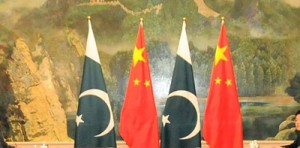- Fears over volatile region of Balochistan could disrupt plans for hub
Financial Times
Amy Kazmin | Farhan Bokhari | Christian Shepherd
 From the window of his plush office, Dostain Jamaldini, the moustachioed chairman of the Gwadar Port Authority, looks upon the mostly deserted, three-berth deep seaport that he argues could one day rival Dubai, Hong Kong or Singapore.
From the window of his plush office, Dostain Jamaldini, the moustachioed chairman of the Gwadar Port Authority, looks upon the mostly deserted, three-berth deep seaport that he argues could one day rival Dubai, Hong Kong or Singapore.
Presently, no cargo ship is visible in the tranquil Arabian Sea waters — just the small fishing trawlers.
But Mr Jamaldini says the empty port, built with Chinese financial and technical help at a cost of $248m, finished nearly a decade ago and barely used since, will buzz with traffic by December 2017. By that time, Gwadar should be linked by road to the rest of Pakistan, a key part of the plan to create a vibrant and bustling hub. “Gwadar has the potential to become one of the world’s biggest ports,” he says. “Once we have connectivity, the port will see traffic. We are now waiting for the road.”
The long-anticipated road is slated to be a modern highway network that seamlessly links Gwadar to China’s Xinjiang province, giving the landlocked Chinese region access to the Indian Ocean. A train should run alongside and Beijing also wants to build oil pipelines from Gwadar to western China, potentially a quicker and easier route for supply from the Gulf.
Yet realising this ambitious vision requires extensive ground infrastructure in Balochistan — one of Pakistan’s poorest, most troubled provinces, with a long history of armed separatist insurgency. Analysts say the region’s volatility could prove an obstacle to realising the $46bn China-Pakistan economic corridor.
In August, Quetta, Balochistan’s provincial capital, was rocked by a sophisticated suicide bomb that killed 70 people, many of them lawyers. Pakistan — which has established a 15,000-man security force to protect the infrastructure and the Chinese engineers — publicly called the attack an attempt to disrupt the massive development.
“The port has been a white elephant all these years,” says Ahmed Rashid, author of several books on Pakistan and Central Asia. “Unless peace comes to this region and there are political deals done, this infrastructure will be another white elephant. Who is going to send goods down this road? Look at the area you are traversing.”
Brahma Chellaney, a professor of strategic studies at New Delhi’s Centre for Policy Research, said securing the infrastructure will remain a continuous, expensive burden. “All it will take for the insurgents to scare away trade on that route will be to carry out hit-and-run attacks on one small stretch of it,” he said. “I think the Chinese are going to feel very frustrated with this investment.”
While Beijing remains publicly committed, some Chinese analysts have suggested it prioritise infrastructure development in Southeast Asia instead.
“The increasing cost of security is becoming a big problem in efficiently pushing forward the projects,” said a recent article in The Global Times, a tabloid owned by China’s Communist Party mouthpiece, the People’s Daily. “It is unlikely to be plain sailing for China and Pakistan?…?People in the two countries should be prepared for setbacks.”
Balochistan’s resistance to Pakistani authority dates back to the 1947 end of British rule, when the heart of the restive region was Kalat state. Initially, it was agreed it could remain an independent, sovereign state but within a year, it was forced to accede to Pakistan. Since then, the sparsely populated region — which is rich in gas and minerals — has had many armed insurgencies. Militants have demanded regional autonomy and that the profits from Balochistan’s vast mineral wealth be used for the province’s development.
For its part, the Pakistani army has ruthlessly suppressed the insurgencies and their civilian supporters. “They threw everything they had against the Baloch,” Srinath Raghavan, a senior research fellow at the Indian Institute of King’s College London, said of the Pakistani military. “The scale and degree of ruthlessness in which military force has been used — not just against insurgents but the civilian population — has been quite intense. The local population has paid quite a heavy price.”
Today, western diplomats in Islamabad say Balochi insurgents have been pushed out of the main cities, though the Shura, or ruling council, of the Afghan Taliban, is still believed to be in the provincial capital, Quetta.
Yet analysts believe the ambitious Chinese infrastructure remains vulnerable. Balochi nationalists call the project “illegal”, and complain the main benefits will accrue to Punjab, the political base of prime minister Nawaz Sharif.
“Putting in this pipeline through an area where people are deeply unhappy with the Pakistani state is waving a red flag,” said Sumit Ganguly, an Indiana University political scientist, focused on South Asian security issues.
In an interview, a Baluchi separatist leader, who asked not to be identified, also warned of turbulence if the project went ahead. “Unless there is a political settlement,” he said, “militant groups will continue to pose a threat to CPEC and will continue to attack wherever there is an opportunity”.




